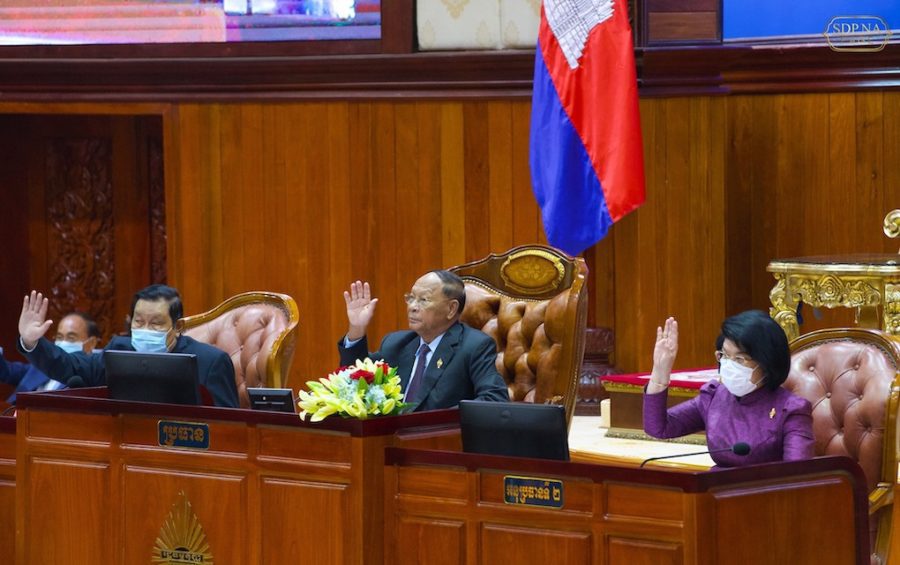A Covid-19 law with penalties up to 20 years in jail for intentionally spreading the disease was passed by the National Assembly on Friday and heads to the Senate, as two hotel security guards accused of allowing people to leave quarantine finished their own two-week isolation and were detained by National Police.
The two guards allowed two Chinese women who later tested positive for Covid-19 to leave Phnom Penh’s Sokha Hotel, according to authorities. The women have been linked to the “February 20” cluster that has led to a surge of coronavirus cases in the country.
Schools have been closed in Phnom Penh and the provinces of Kandal and Preah Sihanouk, which has banned travel in and out of the province. The country reported 442 active Covid-19 cases as of Friday.
Preah Sihanouk provincial authorities on Friday also fined a man 2 million riel, or about $500, for leaving his house in Sihanoukville on Thursday despite being a contact of the February 20 cluster and ordered to quarantine at home.
“He said he left to take his child to get the vaccine and went to have coffee,” said provincial administration spokesperson Kheang Phearum.
“We haven’t taken his money immediately because of the concern that if he has Covid, the Covid might be transmitted through the money,” he added.
On Thursday, the provincial administration on Facebook also requested that residents “do not travel out of the house” and “quarantine voluntarily.”
Sixty-three locations in the city had been closed due to links to the cluster, Phearum added.
In Phnom Penh, the two Sokha Hotel guards finished their two-week quarantine and were passed onto National Police, said Phnom Penh Municipal Police spokesperson San Sokseyha on Friday.
National Police spokesperson Chhay Kim Khoeun said a subcommittee handling Covid-19 cases was processing the two men, but did not have further details. Dy Vichea, the head of the subcommittee, could not be reached for comment.
It is unclear under what law the security guards will be punished, with the newly drafted Covid-19 law now in the hands of the Senate.
National Assembly spokesman Leng Peng Long said all 83 lawmakers present at a session on Friday had voted in favor of the bill, sending it to the Senate. All 125 members of the National Assembly are from the ruling party.
Senate spokesperson Mam Bunneang said laws typically take at least five days to pass through the Senate so senators can check their constitutionality, but the process could be expedited through an emergency session.
Under the new law, escaping self-quarantine can be punished by six months to three years in jail; escaping a treatment center, by five to 10 years; and intentionally spreading the disease, by five to 10 years, or 10 to 20 years if done by an organized group, according to a draft seen by VOD.
Not complying with administrative measures or obstructing measures can also be punished by six months to three years in jail, or two to five years if the action seriously affects public health, according to the draft.
In a statement, Human Rights Watch (HRW) called the law “draconian” and the “wrong approach” to a public health challenge.
“Imposing ridiculously harsh penalties for Covid-19 infractions goes against both public health and human rights principles,” said HRW’s deputy Asia director Phil Robertson.
Making exposure and transmission of coronavirus a criminal offense may have serious public health consequences as increased stigma could deter testing, HRW said.













